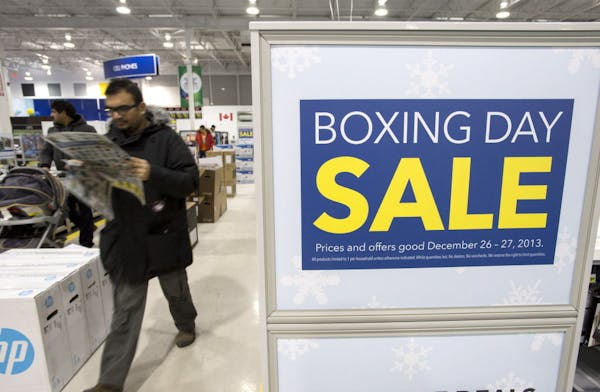In a bid to recoup at least some money from returned products, Best Buy Co. Inc. has enlisted Geek Squad to inspect "open box" merchandise and certify that those previously unwanted laptops and smartphones are fit to be resold. The company hopes customers that see a "Geek Squad Certified Open Box" sticker on a returned product will feel more comfortable that they are not purchasing a broken or defective item.
"Our customers do have very high trust and faith in Geek Squad," Christopher Askew told the Star Tribune in his first interview since the company appointed him last fall to oversee perhaps Best Buy's most profitable business. "Clearly, it gives customers who seek to purchase open-box that trust and confidence that product will function as exactly as it should, as new. Open-box [products] are attractive to value-orientated customers who are looking to save money and still can get access to top brand, knowing that Geek Squad has put its stamp on it."
Since Best Buy already owns the venerable tech support brand, it makes both marketing and financial sense for Geek Squad agents to inspect and certify open-box products. The Richfield-based consumer electronics retailer has struggled with a high level of product returns — consumers each year bring back more than 10 percent of total purchases, a return rate greater than 80 percent of all retailers in the United States. Normally, Best Buy simply sells the returned items to third-party liquidators for pennies on the dollar, a practice that costs the company about $400 million a year.
Under Chief Financial Officer Sharon McCollam, Best Buy is making a determined effort to divert some of that cash back into company coffers. For example, Best Buy recently revamped its supply chain so that shoppers can purchase clearance merchandise and returned products either in the store or online.
"Best Buy is trying to save costs," said Laura Kennedy, an analyst with Kantar Retail consulting firm in Boston. "They don't want to just hand off the products to another company and eat the cost."
The so-called "reverse logistics" effort has taken on increasing importance in recent days. After a poor holiday shopping season that produced disappointing sales and eroded profit margins, CEO Hubert Joly wants to cut costs faster and deeper than the $725 million he already pledged to investors two years ago. Lowering product returns and doing a better job of selling the products that do get returned will make up a big part of those cost savings, Joly told the Star Tribune last week, rather than closing stores and laying off workers.
Across the country, manufacturers and retailers are trying to dispose of growing piles of unsold or returned goods either through recycling, charitable donations or selling them to outside liquidators eager to get their hands on top-quality goods for rock-bottom prices. The size of this "secondary market" is about $329 billion, or about 2 percent of the U.S. economy, according to industry estimates.
But logistics experts say those companies are essentially throwing away money, especially with product returns.
"Companies that ensure timely delivery and processing of returns position themselves to save more or earn more from the returned product," according to a report by UPS and reverse logistics firm Greve & Davis. "Returned products are often untapped sources for revenue. With the secondary discount market for products continuing to grow, there are even more reasons to think about returns as revenue opportunities."
To boost confidence in open-box items, retailers often turn to outside firms to certify the products as sound. But that takes time and in the fast-moving consumer electronics industry, today's hot device could be yesterday's junk in a short period of time. Some secondary-market analysts say high-turnover products like cellphones can lose as much as 10 percent of their value every month.
But Best Buy hopes to leverage its product returns with Geek Squad. These tech agents can also help prevent product returns by helping shoppers pick the right products for their needs in the first place, Askew said.
"Specific to consumer electronics, we are exposing customers to something that is distinct and unique," Askew said. "We're not just putting an open-box item out on the floor. It actually goes through a robust inspection process by a Geek Squad agent on site."
At the same time, "the more we leverage the Geek Squad and our Blue Shirts, the more we reduce product returns," he said.
Thomas Lee • 612-673-4113
Tesla driver in Seattle-area crash that killed motorcyclist told police he was using Autopilot
The US is now allowed to seize Russian state assets. How would that work?

